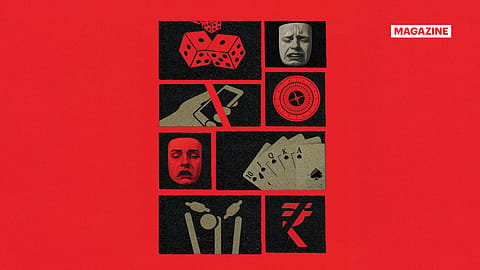Regulation hits reset on Indian gaming boom
How India’s thriving real-money gaming industry went from boom to bust in just four days.

This story belongs to the Fortune India Magazine september-2025-the-year-of-ev-launches issue.
INDIA’S GAMING industry went from being a $2.4-billion sunrise sector to one scrambling for survival — in four days. The Promotion and Regulation of Online Gaming Bill, 2025, which received Cabinet approval on August 19, was passed by both Houses on August 21 and became law the following day after receiving the President’s assent. The legislation stunned the space, as no one anticipated that it would turn their promising business illegal overnight. Over 2,000 real money gaming (RMG)-linked startups are now battling existential crises, throwing the future of 250,000 employees into jeopardy and putting ₹25,000 crore worth of foreign investments in disarray.
The sudden collapse of the RMG-linked industry has triggered panic, with top players such as Dream11, Zupee, and WinZO, among others, halting operations. They are now pivoting to newer avenues and free-to-play formats. For instance, Dream11’s parent Dream Sports has launched financial services app Dream Money while WinZO is eyeing the content market in the U.S. Despite the upheaval, the industry’s leading players have fallen in line, pledging support to Prime Minister Narendra Modi’s call to take India’s sports-tech economy to new heights, in line with the government’s vision. “While this change in law has resulted in a loss of around 95% of our group’s revenue, we remain committed to building a great Indian sports company… rebuilding our business from the ground up will require the collective strength of our people,” Dream11 said in response to Fortune India’s queries.
Many, however, are choosing to wait and watch before making their next move. “All options, including a legal challenge, are on the table right now... This includes moving to Singapore that boasts of a stable tax and policy environment. But one thing is certain: cost-cutting and workforce reduction,” says a senior executive at a top RMG firm, requesting anonymity.
The demise of RMG is set to hit the venture-capital space. Companies such as Dream11, MPL, Games24x7, and WinZO are backed by marquee investors such as Tiger Global, Peak XV, ChrysCapital, Z47, and Think Investments. Collectively, RMG startups have raised over $2 billion in funding, and large write-offs now look inevitable.
The fallout extends beyond online gaming. Sports, the foundation on which RMG companies exploded in popularity in India, saw a surge in several professional leagues because of revenues from sponsorships. The sector spent about $2 billion annually on advertisements, according to reports. Some leagues, such as kabaddi, owe much of their success to RMG sponsorships. Cricket is bracing for an impact as well. The BCCI is already looking for a new jersey sponsor after it and Dream11 decided to end their three-year sponsorship contract that commenced in 2023. Cricket players also stand to lose between ₹150-200 crore.
Some experts argue that the government itself may end up as the biggest loser. The impact won’t be only in terms of lost tax revenues — estimated at ₹25,000 crore annually — but also in the uncertainty over whether its stated goal of eliminating betting in gaming will be achieved. The industry’s tax outgo had surged 422% as of 2024, a stream that has now faded. Industry stakeholders feel an outright ban can’t solve the problem. Though it may prevent a section of users from playing, many will find ways to cash in on the already thriving $100-billion illegal gambling market.
Offshore entities could also double down on luring Indian users, exploiting crypto channels to funnel money, and making money laundering even more pervasive. “When there’s a blanket ban and there’s no regulation, you will always have offline channels grow faster. Muscle power, money power, all of this comes into play,” says Ananay Jain, partner, media, AVGC, E-gaming, Grant Thornton Bharat.
More Stories from this Issue
The government, however, looks confident. After deliberating on the issue for three years, it believes the ban is for the larger public good, which will protect ordinary Indians, specifically those vulnerable to losses, while compensating for the lost revenues through a push for e-sports. It believes that online money gaming platforms have caused widespread harm as families have lost their savings and young people have got addicted. “They have become a major societal concern due to addiction and financial losses, leading even to suicides. Algorithms are opaque, and families are being devastated. Terror financing and money are also linked,” Union IT minister Ashwini Vaishnaw said recently.
With e-sports games that are skill-based and free of betting elements, the government sees India’s youth getting more opportunities as the Centre invests in e-sports tournaments, setting up of academies, research centres and institutions. “The online gaming Bill is a ‘watershed moment’ for Indian e-sports. The distinction will help accelerate mainstream adoption, as parents, educators, and policymakers will view e-sports with credibility,” says Akshat Rathee, co-founder & MD of Nazara-backed NODWIN Gaming. The looming question is: how far will India — with only a few achievements to show on the global front so far — progress in e-sports?
While the law will help curb the betting menace, stakeholders argue a calibrated approach — with tighter regulation and improved controls — would have been more effective than the outright ban. For now, India’s once-thriving gaming industry can only hope for a lucky second innings, even as what lies ahead for the sector is far from clear.